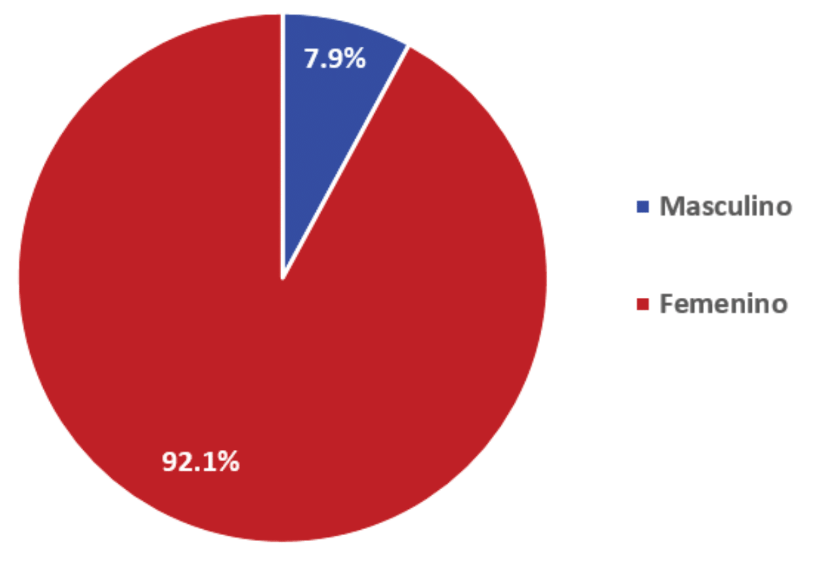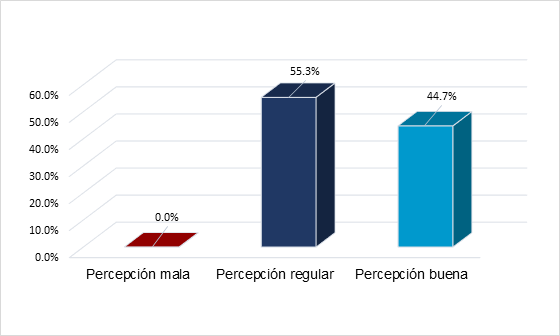ARTÍCULO ORIGINAL
DOI 10.25176/RFMH.v19i3.2159
1 Guillermo Almenara Irigoyen Hospital, Lima - Peru.
a Bachelor of Nursing.
b Intensive Care Specialist.
ABSTRACT
Objetive: To determine the perception on the general competences of nursing teachers by specialist nurses in the intensive care area at the Guillermo Almenara Irigoyen Hospital in 2018. Key words: general competences, nurse, intensive care. Methods: Prospective study and design with qualitative-quantitative approach. Thirty-eight nurses were surveyed using a general skills perception scale, and 7 nurses were interviewed with an interview guide, all intensive care specialists. The perception was categorized into good, fair and bad. Descriptive statistics was used, using absolute and relative frequencies, as well as mean and standard deviation. Results: The average age was 41.39 ± 7.92 years, 92.1% being female. The general competencies of nursing teachers in the intensive care area reached a regular perception of 55.3% and good perception in 44.7%. The aspects with the highest degree of agreement were adaptation to the different situations that occur in daily practice (65.8%), the empathy shown to students (57.9%) and the ability to solve emergency problems (50%). The years of experience were the most relevant referred to the adequate capacity and execution of the nurses. Conclusion: The perception about the general competences of the nursing teachers of the intensive care area of the Guillermo Almenara Irigoyen Hospital in the year 2018 was regular.
Key words: Perception; General skills; Nurse; Intensive care. (source: MeSH NLM).
RESUMEN
Objectivo: Determinar la percepción sobre las competencias generales de los docentes de enfermería por enfermeros especialistas del área de cuidados intensivos en el Hospital Guillermo Almenara Irigoyen en el año 2018. Métodos: Estudio de tipo prospectivo y diseño con enfoque cuali-cuantitativo. Se encuestaron a 38 enfermeras mediante una escala de percepción de competencias generales, y se entrevistó a 7 enfermeras con una guía de entrevista, todas especialistas de cuidados intensivos. Se categorizó la percepción en buena, regular y mala. Se utilizó estadística descriptiva, mediante frecuencias absolutas y relativas, así como media y desviación estándar. Resultados: La edad promedio fue 41,39± 7,92 años, siendo el 92,1% de sexo femenino. Las competencias generales de los docentes de enfermería del área de cuidados intensivos alcanzaron una percepción regular en 55,3% y buena en 44,7%. Los aspectos con mayor grado de acuerdo fueron adaptación a las diferentes situaciones que se presentan en la práctica diaria (65,8%), la empatía mostrada a los estudiantes (57,9%) y la capacidad para resolver problemas de emergencia (50%). Los años de experiencia fue lo más relevante referido a la adecuada capacidad y ejecución de las enfermeras. Conclusión: La percepción sobre las competencias generales de los docentes de enfermería del área de cuidados intensivos del Hospital Guillermo Almenara Irigoyen en el año 2018 fue regular.
Palabras clave: Percepción; Competencias generales; Enfermera; Cuidados intensivos. (fuente: DeCS BIREME)
INTRODUCTION
One of the educational models that bring together the current approaches to educational laws is that of competencies. There is no manuscript, nor reform that does not involve as an indispensable mechanism the educational orientation by competences1. The Tuning Project, one of the pioneers, whose goal is to provide the optimal unification of the pearls of wisdom with the labor actions in the institutions, from a change of culture in the approach of the formative proposals in education2.
Competencies are those peculiarities of an individual who are related to the positive performance of a job and maybe frequent in other circumstances3. On the other hand, generic competencies imply a series of traits in the cognitive and motivational sphere, which manifested itself through instrumental competencies such as capacity for analysis, synthesis, organization, planning and information management; of personal competencies such as the fact of working in a team, the ability to conduct relationships with others and ethical responsibility; and of systemic competencies such as autonomous learning, adjustment to new conditions, creativity and leadership, among others4.
Nursing professional competencies, such as teachers, not only rely on fractional knowledge or skills but rather are built based on the succession of learning actions, which revolve around the relevance and transcendence given to the worker, being his capacity, his reason, and his contribution of ideas the one that achieves importance for the adjustment of the variations, with the purpose of improving the attention and development of the nursing professional5. Said professional, while working in an area of special care, must provide adequate care to patients and educational training to their students, since the latter will be the future specialists who will perform important functions in the area of Intensive Care. However, sometimes there is poor work in basic aspects that should be handled, perhaps due to poor orientation, both theoretical and practical.
It should be noted that in a work developed by Argüello (2016) it was found that the main competencies evidenced in the nursing practice tutor were updated disciplinary knowledge, adequate teaching development, good communication, self-control, etc.6
Taking into account the aforementioned, this work provides relevant data on the profile of general competencies of nursing teachers of the Intensive Care Unit, based on the perceptions of their specialist colleagues who do not work as teachers, who contributed to reveal the characteristics of their functions and disabilities after observing them at the time of their performance, in addition, this serves as a precedent that motivates to the development of other investigations, since there is little material focused on this subject of study.
The objective of this article is to determine the perception of the general competencies of nursing teachers by specialist nurses in the intensive care area at the Guillermo Almenara Irigoyen Hospital in 2018.
METHODS
A prospective and design study with a qualitative-quantitative approach was performed. The study sample consisted of 38 nurses for the quantitative phase, and 7 nurses for the qualitative phase, all with a specialist degree working in the Intensive Care Unit of the Guillermo Almenara Irigoyen Hospital during 2018, who met the criteria of inclusion and exclusion.
Inclusion criteria:
• Nurses specialists in the intensive care area of the Guillermo Almenara Irigoyen hospital.
• Specialist nurses with a minimum of 5 years of experience working in the intensive care area.
• Specialist nurses who do not engage in practical teaching.
Exclusion criteria:
• Specialist nurses are not in the intensive care area.
• Nurses specializing in intensive care who work less than 5 years in the area in question.
• Specialist nurses who do not agree to participate in the research work and do not sign the informed consent.
The technique used was the interview and survey. Two instruments were used: An Interview Guide (Qualitative Phase), consisting of 2 basic questions about the perception of specialist nurses about the practical teaching of their colleagues. The other instrument was the perception scale on general competences (quantitative phase), consisting of 14 items, with a Likert response with 5 response alternatives where:
• Agree equals 5
• Agree equals 4
• Neither agree and disagree equals 3
• Disagreement equals 2
• Strongly disagree equals 1
Both instruments were validated through expert judgment through the binomial test, obtaining agreement between their assessments (p <0.05). Likewise, the scale was made reliable by a pilot test, obtaining a Cronbach's alpha coefficient of 0.91, that is, a very high reliability, being the instrument suitable for its application.
To categorize the perception of general competences, a total score of 14 to 70 points was obtained, and made a scaling as follows:
K= ((No. of items x highest score) - No. of items) ÷ 3)
K = ((14 x 5) - 14) ÷ 3) = 18
With the value of the constant (K) it is used to obtain the following categories:
Good perception: 52 – 70 points.
Regular perception: 33 – 51 points.
Bad perception: 14 – 32 points.
For the measurement of the variable, descriptive statistics, absolute frequency, percentages, and arithmetic average were used. The results were presented in graphs and / or statistical tables. For the qualitative phase: the interviews conducted were degraded.
The study was executed with the approval of the Institutional Committee of Research Ethics (CIEI) of the Guillermo Almenara Irigoyen Hospital, and the bioethical principles were fulfilled, applying the respective informed consent to the nurses of intensive care, protecting the confidentiality of their data.
RESULTS
A total of 38 nurses with a specialist degree who work in the Intensive Care Unit of the Guillermo Almenara Irigoyen Hospital during 2018 were surveyed. The average age was 41.39 ± 7.92 years, 92.1% being female and 7.9% male (Figure 1).
The general competencies of nursing teachers in the intensive care area reached a regular perception in 55.3% and good in 44.7%. (Figure 2).
Table 1 shows one of the aspects evaluated within the general competencies of teachers regarding their adaptation to the different situations that arise in daily practice, which received 65.8% agreement, and the ability to solve problems emergency with 50% agreement. To complement these points, they were interviewed regarding the proper execution of the procedures aimed at the patient, stating that “..the intensivist nurse already has in mind all the procedures, it is not necessary to run to take the procedures guide to know what materials or how the procedure is going to be, one already from experience and for the years already knows what materials .. ”, they also mentioned that“... in the vast majority they execute their procedures according to the protocols we handle and there are years of experience, one or the other that suddenly they can be trusted and they can ignore some steps of the long protocols but in general lines they execute according to the procedures according to the established protocols”, on the other hand, they also declare something negative“... it seems to me that we are failing a lot in what is biosecurity.”
An aspect also evaluated within the competences is the empathy shown to the students that was answered as agreed by 57.9%, however, the one that takes into account the opinion of the student were answered indifferently by 39.5%. (Table 1) At the time of interviewing the nurses regarding the interrelation between the teacher and student, they stated “... there is a cordial relationship maintaining a line of authority from teacher to student”, likewise “it is a direct interrelation since the practices they are done during working hours in such a way that the student not only sees the different procedures but has the facility to ask why these procedures can be performed and under what circumstances”.
On the other hand, the aspects considered as answers in disagreement were that the teacher organizes and distributes his time to exercise his work in the intensivist and teaching practice in 26.3%, and the teacher works as a team with the other colleagues in 21.1%. (Table 1) Regarding the latter, they replied that “the ICU practice teacher generally dominates some areas of the specialty more than others, and generally does not ask his colleagues to dominate other areas to support them in the formation of those issues or procedures that do not dominate.”
Finally, the use of Technologies of Information and Communication (TICs) by the teacher was agreed as 55.3%, but the updating of their knowledge through constant training was answered indifferently in 47.4%, and the teacher's leadership in 39.5% disagreed. (Table 1)
Table 1. Items of general competencies of nursing teachers in the intensive care area of the Guillermo Almenara Irigoyen hospital in 2018.
| Items About General Competences | Totally agree | Agree | Does not agree nor disagree | Disagree | Totally disagree | |||||
|---|---|---|---|---|---|---|---|---|---|---|
| N | % | N | % | N | % | N | % | N | % | |
| The teacher uses Technologies of Information and Communication (TICs) | 7 | 18.4% | 21 | 55.3% | 7 | 18.4% | 3 | 7.9% | 0 | 0.0% |
| The teacher applies his knowledge in a intensivist practice | 10 | 26.3% | 21 | 55.3% | 7 | 18.4% | 0 | 0.0% | 0 | 0.0% |
| The teacher updates his knowledge by receiving constant training. | 4 | 10.5% | 13 | 34.2% | 18 | 47.4% | 3 | 7.9% | 0 | 0.0% |
| The teacher has a good Communication with Students, creating a Trustworthy environment. | 9 | 23.7% | 13 | 34.2% | 13 | 34.2% | 3 | 7.9% | 0 | 0.0% |
| The teacher makes Appropriate decisions With the multidisciplinary Team when facing an Emergency. | 9 | 23.7% | 15 | 39.5% | 8 | 21.1% | 5 | 13.2% | 1 | 2.6% |
| The teacher works as a A team with the other Colleagues. | 2 | 5.3% | 18 | 47.4% | 10 | 26.3% | 8 | 21.1% | 0 | 0.0% |
| The teacher takes into Account his students' Opinion | 5 | 13.2% | 12 | 31.6% | 15 | 39.5% | 6 | 15.8% | 0 | 0.0% |
| The teacher keeps an Ethical behavior | 6 | 15.8% | 19 | 50.0% | 8 | 21.1% | 5 | 13.2% | 0 | 0.0% |
| The teacher sympathyzes with his students. | 9 | 23.7% | 22 | 57.9% | 7 | 18.4% | 0 | 0.0% | 0 | 0.0% |
| The teacher shows Interest in the students With learning problems. | 7 | 18.4% | 15 | 39.5% | 10 | 26.3% | 5 | 13.2% | 1 | 2.6% |
| The teacher has the The ability to solve Emergency problems | 12 | 31.6% | 19 | 50.0% | 6 | 15.8% | 1 | 2.6% | 0 | 0.0% |
| The teacher exercises Leadership. | 11 | 28.9% | 12 | 31.6% | 15 | 39.5% | 0 | 0.0% | 0 | 0.0% |
| The teacher adapts to The different situations That may arise during his Daily practice | 6 | 15.8% | 25 | 65.8% | 7 | 18.4% | 0 | 0.0% | 0 | 0.0% |
| The teacher organizes and Distributes his time to do His work in the intensivist And teaching practice | 5 | 13.2% | 13 | 34.2% | 7 | 18.4% | 10 | 26.3% | 3 | 7.9% |


DISCUSSION
The clinical practice teacher, in this case of nursing, plays a role of great importance and involvement in the student, and goes beyond the teaching of procedures and techniques, but is a continuous accompaniment and sharing experiences, all this It will affect on the development of future professionals. Therefore teachers must have their appropriate skills.
In the present study, the perception of the general competencies of nursing teachers in clinical practice in intensive care was mainly from good to regular. At this point, it coincides with the study that found that 75.72% of students perceive competencies in the process of development, and 20.23% perceive it as developed competencies7, different from what was evidenced in other research where they found that the general perception of students regarding the role of teachers in the formation of humanized care is considered good in 98%8, as well as other research describes that the perception of teaching performance in clinical practice by students was very good at 69 %9.
The skills related to adaptation to different situations in daily practice, as well as the ability to solve emergency problems by teachers were accepted by the majority of nurses surveyed. Many of these aspects are endorsed, as they refer, to the years of experience that teaching nurses have, which makes the management of the practice very pertinent based on protocols and regulations. However, it is important to emphasize that, despite this, there are issues that weaken their clinical actions such as biosafety. Regarding this, an investigation indicates that among the essential competencies, updated disciplinary knowledge (87.59%), and teaching capacity (49.16%)6 stood out.
Another aspect determined in the study is the empathy shown to the students, as well as taking into account their opinion, which was perceived favorably by the majority, highlighting the cordiality with which the teacher interacted with the student, as well as the opportunity to ask or comment on different processes during the development of the practice; In this sense, other authors, in their work, qualified the perception that nursing students have in the teaching interaction - students as good at 94% and only 6% is regular8. It is necessary to consider that the relationship that the teacher establishes with the student, could be decisive in the development of the learning process, as it will generate a better climate and with it a better development in both parts.
CONCLUSION
Based on the results obtained in this research, it is concluded that the perception of the general competencies of nursing teachers in the intensive care area of the Guillermo Almenara Irigoyen Hospital in 2018 was mainly regular.
Authorship contributions: The author made the genesis of the idea, project design, data collection and interpretation, analysis of results, preparation of the manuscript of this research paper.
Conflict of interest: The author declares no conflict of interest in the publication of this article.
Financing: Self-financed.
Received: April 15, 2019.
Approved: June 30, 2019.
Correspondence: Carmen Susana Alva Mayuri
Address: Jr. Máximo Alvarado Nro 286 - San Juan de Miraflores, Lima-Perú.
Telephone: 995039075
E-mail: xuperxu9@gmail.com
